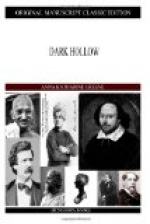“Yes.”
“And the coincidence of his presence in the ravine?”
“Yes.”
“But these are puerile reasons.” He was speaking peremptorily now and with all the weight of a master mind. “And you are not the woman to be satisfied with anything puerile. There is something back of all this; something you have not imparted. What is that something? Tell—tell—”
“Oliver was a mere boy in those days and a very passionate one. He hated Etheridge—the obtrusive mentor who came between him and yourself.”
“Hated?”
“Yes.”
“Hated?”
“Yes, there is proof.”
“Of his hate?”
“Yes, judge.”
He did not ask where. Possibly he knew. And because he did not ask, she did not tell him, holding on to her secret in a vague hope that so much at least might never see light.
“I knew the boy shrank sometimes from Algernon’s company,” the judge admitted, after another glance at her face; “but that means nothing in a boy full of his own affairs. What else have you against him? Speak up! I can bear it all.”
“He handled the stick that—that-”
“Oliver?”
“Yes.”
“Never! Now you have gone mad, madam.”
“I would be willing to end my days in an asylum if that would disprove this fact.”
“But, madam, what proof—what reason can you have for an assertion so monstrous?”
“You remember the shadow I saw which was not that of John Scoville? The person who made that shadow was whittling a stick; that was a trick of Oliver’s. I have heard that he even whittled furniture.”
“Good God!” The judge’s panoply was pierced at last.
“They tried to prove, as you will remember, that it was John who thus disfigured the bludgeon he always carried with pride. But the argument was a sorry one and in itself would have broken down the prosecution had he been a man of better repute. Now, those few chips taken from the handle of this weapon will carry a different significance. For in my folly I asked to see this stick which still exists at Police Headquarters, and there in the wood I detected and pointed out a trifle of steel which never came from the unbroken blades of the knife taken from John’s pocket.”
Fallen was the proud head now and fallen the great man’s aspect. If he spoke it was to utter a low “Oliver! Oliver!”
The pathos of it—the heart-rending wonder in the tone brought the tears to Deborah’s eyes and made her last words very difficult.
“But the one great thing which gives to these facts their really dangerous point is the mystery you have made of your life and of this so-called hermitage. If you can clear up that, you can afford to ignore the rest.”
“The misfortunes of my house!” was his sole response. “The misfortunes of my house!”




